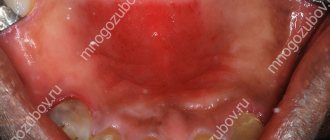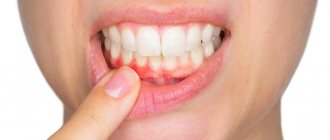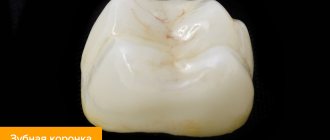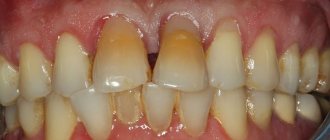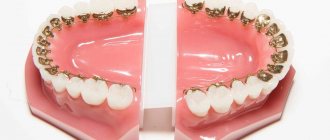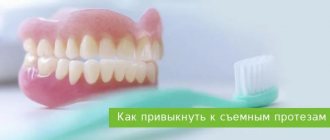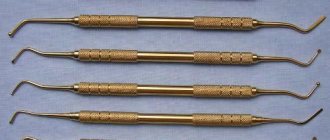Author: Brodsky Sergey Evgenievich Deputy Chief Physician, Candidate of Medical Sciences in the specialties: dentistry and medical microbiology In dentistry, there are many ways to restore missing teeth, but sometimes an allergic reaction may occur to anesthesia and some materials. Let's figure out why allergies to anesthesia and materials for making removable dentures and crowns appear.
Allergy to dentures
The most common allergens are dentures made from base metals, zinc, copper, steel, as well as dentures made from standard acrylic plastic.
These materials are actively used in prosthetics for the production of bases for clasp and acrylic dentures, dental bridges due to their low cost. The appearance of an allergy to these materials causes one thought in people: what to do? The main signs of an allergic reaction to dentures will be the following:
- discomfort in the oral cavity - pain in any part, bitterness in the tongue, dryness and sore throat;
- exacerbation of chronic diseases of the oropharynx and nasopharynx, causing problems with the respiratory tract;
- severe swelling and hyperemia near the prosthesis.
The appearance of these symptoms indicates the need for urgent diagnosis and initiation of treatment, but first of all it is necessary to urgently eliminate the irritant. The easiest way to get rid of a removable denture is made of acrylic, which can be easily removed independently; most often, in case of allergic reactions, it is replaced with an acrylic-free denture. If you have a non-removable dental structure in your mouth, you should visit a dentist as soon as possible to remove it. After eliminating the source of the allergy, the material to which it arose is identified, since several types are used in the manufacture of crowns, and other components are selected for the new prosthesis.
Can you be allergic to a titanium dental implant?
Allergic reactions to artificial titanium roots are extremely rare.
In only 1% of cases, hypersensitivity to this metal is observed. If removable dentures, crowns or bridges cause allergic reactions in a person, then installing implants is the best alternative. At the Partner-Med clinic, we use only proven and certified brands of dental implants:
IMPRO IMPLANT
39,000 RUR WITH METAL-CERAMIC CROWN
OSSTEM IMPLANT
49,900 RUR WITH ZIRCONIUM CROWN
ASTRA TEK
74,000 RUR WITH ZIRCONIUM
CROWN STRAUMANN IMPLANT
62,000 RUR WITH ZIRCONIUM CROWN OH
Can there be an allergy to metal-ceramic crowns?
Allergies to metal-ceramic crowns are not a common occurrence, since they consist of 2 parts - a metal frame and a ceramic lining. The frame is usually made of a metal alloy and may contain cheap allergenic species such as copper or nickel. In Russia, 50% of crowns are made of such alloys. That is why it is worth knowing how an allergy to a metal-ceramic tooth crown manifests itself. This will help you notice dangerous manifestations in a timely manner and seek help from a dentist.
The most common symptoms of an allergy to metal-ceramic crowns are:
- bitterness in the mouth;
- increased salivation;
- severe redness and swelling of the mucous membrane;
- rashes on the skin and in the mouth.
How to treat teeth if you are allergic to anesthesia
Approximately 25% of people have an allergic reaction to anesthetics, most often novocaine, less often lidocaine, used for pain relief in dentistry during dental treatment.
This injection causes a large number of side effects, nausea, headache, arrhythmia, so in most paid clinics, which include Moscow Dentistry Partner-Med, they use only proven anesthetics based on articaine and mepivacaine, and before starting treatment, a medical card is filled out and anamnesis collection. However, a negative reaction can also occur to other anesthetic drugs, which makes dental treatment and prosthetic procedures difficult, so you should only contact dental centers that have an excellent reputation.
Our clinic employs dentists who have a high professional level and are able to quickly and effectively solve the most complex problem. If a patient with a serious dental problem and an allergy to anesthetics comes to us for help, we will definitely help him. Experienced doctors working at the Partner-Med clinic know very well how to painlessly remove a tooth if the patient is allergic to anesthesia. To achieve this goal, the patient may be offered several options:
- Replace the anesthetic causing the allergic reaction
- Carry out all serious dental procedures that cause pain under general anesthesia.
- Before implantation, take an antihistamine and, while it is working, perform all painful manipulations under anesthesia.
- Carry out treatment under sedation - immersing the patient in a state of mild loss of reaction. A person in this state seems to be asleep, but at the same time hears the doctor and fulfills all his requests.
Are there allergies to zirconium crowns?
For decades, gold alloys with a high degree of biocompatibility have been considered the best solution for making crowns. However, recently it has been scientifically confirmed that the biocompatibility of zirconium dioxide is the same as that of noble metals. This confirms that zirconium crowns are not capable of provoking an allergic reaction and structures with them can be worn without fear.
Allergy to a metal pin or inlay in a tooth
No specialist can predict what the patient’s body’s reaction will be to a foreign object located in the tooth canal, so an allergic reaction is detected after the metal pin or inlay is installed in the tooth canal.
Allergies are provoked by:
- Alloy ions, actively released into the blood by the metal rod, begin to react with other substances.
- Contact of the pin with periodontal fibers (during perforation of the tooth root.
In addition, allergic manifestations can be triggered by “galvanic syndrome”. It occurs in the mouth when there are different metals there, which may be incompatible and provoke the occurrence of galvanic currents, so an allergy to a pin in a tooth may be accompanied by the following symptoms:
- the appearance of a metallic taste in the mouth;
- burning of all areas of the mucous membrane;
- profuse salivation.
Just CALL US!
+7
We will answer any of your questions and will definitely help you!
Allergies from dentures - myth or reality?
Prosthetics are an excellent chance to restore lost teeth or correct aesthetic defects. There are contraindications for installing crowns and dentures. These include allergic reactions of the patient to the dental material used.
Denture allergies are not a myth. The problem is urgent and becoming quite global; a generation is growing with a reduced or incorrect, atopic response of the human immune system.
Allergic reactions very often occur to artificial crowns that are in the mouth. They mainly react to products made of metal, metal-ceramics, or more precisely, to one of the components of the alloy.
Metal-ceramics and metal-plastic
Can there be an allergy to a metal-ceramic crown? Here, the likelihood of an allergic reaction depends on the quality of the materials, in particular the metal used. For example, often an allergy to a metal-ceramic crown occurs if the base cap is made of a nickel alloy rather than gold or titanium. Or, for example, this option - if the metal-ceramic crown is ordinary, i.e. not on the shoulder mass, then it will provoke an allergic reaction much more often. As the gums eventually begin to come into contact with the metal along the edge of the crown, allergens will accumulate in them.
Read on the topic: metal-ceramic crowns - what they are, on the shoulder mass and ordinary ones, for whom they are suitable.
In metal-plastic materials, both metal and plastic can become an allergen. Therefore, such products should not be worn for longer than the prescribed period - several weeks or months. Or place them on artificial gums so that the edges of the crowns do not rest on the mucous membranes.
Which components are allergens?
In the manufacture of metal and metal-ceramic prostheses, nickel-chromium or cobalt-chromium alloy and copper are used. The first option causes allergic reactions more often than others.
There is a burning sensation in the oral cavity, redness of the gums around the crowns, and swelling of the soft tissues may occur. Because of this inflammation, when chewing and chewing food, the gums begin to hurt and bleed. A metallic taste in the mouth and a tingling sensation should alert a person and force him to see a doctor at the clinic.
This type of metal dental structures is inexpensive and therefore popular.
Allergic reactions to removable dentures are possible, specifically to the plastic and acrylic from which the structure is made. In addition to the material itself, the composition with which the prosthesis is painted can be an allergen. The dye used to make removable dentures pink is more likely to cause a reaction. There is a burning sensation in the mouth and swelling of the gums on which the prosthesis is located.
Causes of allergic reactions
Allergies can be caused by both metal and plastic structures.
- Alloys of nickel, chromium and cobalt are included in the group of allergens and can provoke severe allergic reactions. Unfortunately, these alloys are part of many orthopedic designs.
- Another group of allergens is a protein monomer, which is formed during the manufacture of polymers, for example, acrylic. The higher the monomer concentration, the stronger the reaction. Normally, its presence in acrylic plastic should not exceed 0.2%.
- The reaction can be caused by dyes and plasticizers (substances that reduce the formation of micropores) included in the restoration.
Expert opinion
Roman Borisovich Alekperov
orthopedic dentist
Experience: 24 years
As a rule, an allergic reaction does not always occur immediately after the installation of a crown or prosthesis. It can appear even after several years of use. It happens that when altering old structures with new ones, a reaction such as burning and swelling of the gums occurs. It seems that a person wore metal-ceramic crowns or a prosthesis for many years, got new ones, and six months later severe allergic manifestations began. Of course, to prevent such a development of events, it would be good to check with an allergist before getting prosthetics and take tests for sensitivity to dental materials. And then, new teeth, a new smile will give you pleasure, and not a headache and searching for the cause of poor health all your life. If you have the financial opportunity, it is better to immediately install crowns or prostheses made of zirconium dioxide. Hypoallergenic material. Take care of yourself and be healthy!
Irritation due to galvanic syndrome
Galvanic syndrome is a condition when an electrical impulse occurs between prostheses made of dissimilar metals. Moreover, crowns can be metal, metal-ceramic, or metal-plastic (the main thing is that metal is present). Galvanism occurs not only between crowns, but also between crowns and other prostheses. For example, clasp with metal hooks or a palatal bridge, as well as implants (less often). There is a tingling sensation in the mouth, an “electric sensation,” and a sour or bitter taste.
The occurrence of galvanism depends on how dissimilar metals are able to interact with each other (how different their electrochemical activity is), and not on the quality of the metals themselves. Therefore, you should always be interested in what crowns are made of and report this important information to the dentist during subsequent prosthetics. According to statistics, 15-35% of orthopedic dentists’ patients experience galvanic syndrome. For example, galvanosis may appear due to the presence of gold and nickel-chrome prostheses.
How does an allergy to dentures manifest?
Let's summarize. What symptoms after the prosthetic procedure should prompt a person to think about a complication - an allergy to dentures and independently contact the attending physician at the dental clinic:
- burning in the mouth
- red gums
- elevated temperature
- bleeding gums
- rash in and around the mouth
- swelling of soft tissues (cheeks, gums, tongue)
- swelling of lips, eyelids
- metallic taste
- tingling
- pain when chewing
- increased salivation
- cough as in bronchial asthma
- Quincke's edema
First aid at home
If you notice characteristic symptoms of an allergic reaction, you should immediately remove your dentures - if they are removable. If they are not removable, rinse your mouth and take an antihistamine. For example, “Suprastin”, “Fenistil” drops or “Tavegil”. They are considered the most powerful, but with side effects such as drowsiness and slower reactions. Next, you should immediately contact the dentist who placed the prosthesis. While you are waiting to see a doctor, eliminate any potential allergens from your environment - citrus fruits, chocolate, ketchup, dust, and have less contact with animals. Because it is possible that an exacerbation of some “old” allergy has occurred.
If there is sudden swelling of the face, neck, arms, legs, it becomes difficult to breathe, or a rash appears all over the body, then immediately call a doctor or an ambulance.
How to help with allergies?
What should you do if you encounter such manifestations in the oral cavity? If your allergy symptoms are severe, you should take an ambulance - an antihistamine (suprastin, zodak, etc.). And then according to plan.
First, see your dentist and find out the reason why this happened. Perhaps a specialist will suggest:
- elimination test - will remove the prosthesis, crown for 1-7 days
- exposure test - after the negative symptoms disappear, he will install the structure back and monitor the progress of the condition.
Secondly, visit an allergist and take tests, allergy tests for a reaction to dental material. Then, based on the research results, it is necessary to change the designs to those prostheses that will not cause an allergic reaction.
What materials provoke allergies?
The following substances can provoke an allergic reaction in orthopedic dentistry:
- synthetic polymers: plastic, nylon, acrylic, etc.,
- metals: base metals are more likely to become allergens than noble metals,
- anesthetic drugs, filling compounds, antiseptics: if used incorrectly, they can cause local irritation,
- dental cement on which dentures are glued.
But ceramics, zirconium and aluminum dioxides, composite materials for filling, as well as titanium without impurities are considered hypoallergenic.
Don't know what type of prosthetics to choose?
We will help in the selection, advise where to read more information and compare types of prosthetics.
Consultation with an orthopedic doctor in Moscow clinics is free! Call now or request a call
Working hours: from 9:00 to 21:00 - seven days a week
However, there is still no material for prosthetics that is 100% inert, i.e. There is always a risk of allergies - to a large extent it depends on the person himself, his individual reaction. At the same time, modern high-quality materials are very well cleaned at the production stage, and the maximum amount of harmful substances is removed from them. Therefore, they can cause problems extremely rarely - in 1 case out of a million or even less often.
Requirements for prostheses to replace those that cause allergies
Metal-ceramic prostheses can be replaced with structures made of zirconium oxide. Zirconium does not cause allergies and does not oxidize in the oral cavity under the influence of saliva and other liquids.
Products made of gold, platinum, titanium, and precious metals are safe in this regard. But they are expensive, not everyone can afford them.
If you are allergic to an acrylic prosthesis, you should use acryfree, that is, a material that does not contain acrylic plastic. Or new generation products, with a minimum amount of substances that can cause a reaction, nylon prostheses.
Let us repeat, you can select dental material for a new prosthesis only after a complete examination by an allergist.
The main requirement for a prosthesis is not only strength and aesthetics, but also resistance to chemical attack. Do not oxidize when interacting with saliva and food, be hypoallergenic and safe for the body as a whole.
Preventive measures against allergies
To prevent the occurrence of allergies even before the moment of prosthetics, you need to take care of the possible consequences, so as not to urgently correct the situation later. Both the orthopedic surgeon and the patient himself should be interested in this. Before restoring teeth, a high-quality diagnosis, anamnesis collection and individual selection of structures are necessary, taking into account the characteristics and reactions of the patient. You can do allergy tests to exclude unwanted components from future designs and then choose prosthetic options.
Technologies and materials for prosthetics are developing; today it is possible to install structures that completely coincide with the physiological characteristics of the patient and take into account his individual anatomy. Therefore, choosing a qualified doctor who knows prosthetic techniques and knows about modern materials is also important.
For his part, the patient should try to monitor nutrition and oral hygiene, and maintain good shape.
- WHO – World Health Organization
- SOUTH. Romanova, V.V. Sadovsky, Diagnosis of allergic reactions in persons using removable dentures with an acrylic base [Electronic resource], – https://stomport.ru/articles/diagnostika-proyavleniy-allergicheskih-reakciy-u-lic-polzuyushchihsya-semnymi-zubnymi – article on the Internet.
Author: Chernov A. R. (Thank you for your help in writing the article and the information provided)
Questions and answers
I am registered for implantation of BOI implants with KOS and BCS systems at Proletarskaya - what medications will be used?
Good afternoon. I have an appointment for implantation at Proletarskaya with BOI implants with the KOS and BCS systems. To carry out the operation, I need to undergo allergy diagnostics. What anesthetic medications will I use to properly identify possible allergens?
Hello!
When performing dental implantation, our clinics use the anesthetics Ubistezin and Ultracain. If you require additional information, we recommend that you consult your physician. Sincerely, SIMPLADENT Patient Support Center + + 8-800-333-53-41 Other questions
First aid and treatment methods
The main task when an allergic reaction occurs is to eliminate its source as quickly as possible. With a removable structure, this is easy to do; just remove it. In the case of dental crowns, you should make an appointment with a prosthodontist. Until this point, it is recommended to rinse your mouth with antiseptic solutions.
Experts advise immediately taking an antihistamine (for example, Claritin or Tavegil) if you have allergy symptoms. With the help of the drugs “Enterosgel” or “Smecta” it will be possible to quickly remove the allergen from the body. If soft tissues are damaged, healing gels (for example, Cholisal) can be applied.
If you experience severe pain, you are allowed to take a non-steroidal anti-inflammatory drug (for example, Nise). In advanced situations, if the pills do not help, you should call emergency help. If an allergic reaction occurs, it is important to replace it with structures made from hypoallergenic materials. This is the only way to cope with the disease.
To exclude the possibility of developing allergies, it is recommended to use metal-free dentures
Braces
Stainless steel braces are generally considered safe. However, alternatives to nickel-free stainless steel braces include:
- Ceramic brackets made of polycrystalline aluminum oxide, monocrystalline sapphire and zirconium dioxide;
- Plastic braces;
- Titanium braces;
- Gold plated braces.
Clarity Advanced ceramic braces.
Extraoral metal products, including metal decorations on headdresses, deserve special attention due to the greater sensitivity of the skin on them. For these patients, plastic-coated jewelry is a better alternative.
What are hypoallergenic crowns?
Products made from metal-free ceramics are recognized as hypoallergenic crowns. Due to the absence of a metal base, a person does not develop individual intolerance. The design is characterized by high aesthetics and reliability, but its disadvantages include high cost.
It can be made of porcelain, aluminum dioxide or zirconium dioxide. In all cases, the possibility of an allergic reaction is excluded.
Content
- How does an allergy manifest itself?
- Allergy diagnosis and treatment
- Features of dental prosthetics in the presence of allergies
- Recommendations for allergy sufferers
Components used for the manufacture of removable dentures, crowns, and bridges may be responsible for the development of delayed hypersensitivity reactions - contact allergies caused by the activation of a specific cellular immune response by the allergen. Contact allergy is the result of exposure of the oral mucosa (tongue, cheeks, lips) to foreign material.
PROMOTION
Installation of crowns, dental bridge
RUB 3,450
Allergy and hypodontia
The search found three articles, and only one article dealt with the relationship between allergies and hypodontia. Third molars are the most commonly missing teeth, followed by second premolars and maxillary lateral incisors.[42] The etiology of hypodontia is considered multifactorial, with genetics and environmental factors playing important roles.[43] Yamaguchi et al[44] in 2008 studied 3683 Japanese orthodontic patients and found a positive correlation between allergies and hypodontia. They concluded that health problems, especially those related to allergies, are of great importance and may have a significant association with hypodontia.
